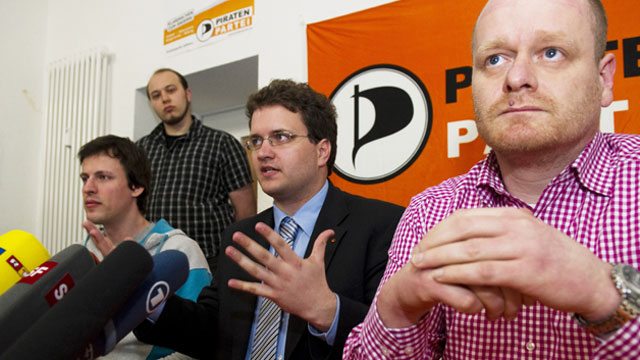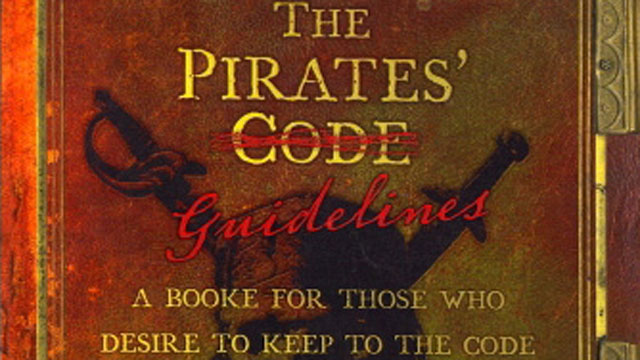
By now, it’s no secret that the NSA’s PRISIM program has been collecting data from internet and phone users for quite some time. Needless to say, the United States Pirate Party is not exactly thrilled with this. In response, the third party, which has an unusual platform that is pro-Internet piracy and pro-privacy, released a statement condemning the actions of the NSA. While the United States Pirate Party throws their hat in the ring to join the national debate about freedom versus security, here’s five quick facts about their organization.
1.The Unites States Pirate Party Is A Smaller Part Of A Larger Movement

The Pirate Party Is A Legitimate Political Force in Sweden (Business Week)
Not even qualifying for First Mate status, the United States Pirate Party is a relatively minor political force within the United States, as it only is registered at the State level in eight States and currently holds no elected positions. However, the Pirate Party also has chapters in Sweden, Germany, the Czech Republic, the Netherlands, Finland, Canada, Switzerland, Spain, Australia, New Zealand, Greece, France, Israel and Iceland, making it something of an international movement.
The first pirate party in Sweden was founded in 2006, and the party boasts two members of Sweden’s European parliament. By comparison,the Czech Republic has one Pirate Party parliamentarian, Iceland has three and Germany has 45 state-level Pirate lawmakers, making the United States Pirate Party a relatively unimportant part of the debate on an international scale.
2. The United States Pirate Party Is Actively Recruiting A Crew

The Massachusetts Pirate Party at the Boston Pride Parade (Facebook)
Since the reveal of the NSA wiretapping the world, the United States Pirate Party is scouring the seas of the Internet for new members for their IT and Press Departments. Something big is cooking, as the United States Pirate Party attempts to become relevant in the national stage. It’s not known whether these are paid positions (our guess is they’re volunteer), but if you’re interested in issues of Internet freedom and Intellectual Property reform, the United States Pirate Party’s Facebook page might be a good place to start.
3. The United States Pirate Party Plans on Forming a New Social Network

The Pirate Party gathers (Yahoo)
With news that Facebook is one of many companies that were actively tracked by the NSA, it’s no wonder that a political party that bases their platform on Internet freedom and privacy is interested in creating a social network that is free from surveillance. Speaking to Business Insider, Party ‘Captain’ Lindsay-Anne Brunner claims that the United States Pirate Party is modeling their social network off Diaspora , a failed social network that uses Secure Socket Layer (SSL) technology to encrypt information stored on the social network. How the United States Pirate Party plans to undertake this, or whether their call for new crew members is any way connected remains to be seen.
4. The United States Pirate Party Is Running Candidates in 2016

Pirate Party Members Celebrate Election Results (The Guardian)
While the United States Pirate Party doesn’t have any candidates in elected office, they hope to strengthen their offerings in the years to come. Asked on a recent Reddit AMA whether the Pirate Party plans on running candidates in the next election style, ‘Captain’ Lindsay-Anne Brunner said the following:
In 2016, we hopefully will have a few states with Pirate candidates. NYPP is running its first candidate (local office) in 2013.
The Pirate Party internationally in 2016? Hopefully it’s a bit stronger in other Eurozone countries and Australia.
While it’s unlikely that the United States Pirate Party would win or even contest any seats in the Senate or House of Representatives, some local positions may be possible given the right support and backings. Brunner also said that it’s been a “consideration” to endorse candidates who have favorable views on patent laws and internet freedom.
5. The United States Pirate Party Has Eight Core Values In Their Constitution

While the political positions of the United States Pirate Party vary from left-libertarians, classical liberals, anarchists, progressives, and radical centrists, the Party still has eight core intrinsic values that they believe create themselves into a distinct entity. These values are outlined in their constitution and call for open and free culture, transparent and open government, pro-individual (both people over corporations and individual privacy), and an equal playing field for everyone.
.
1. We stand for open culture. No one should have the power to prevent the free exchange and expression of ideas, tools, or works.
2. We stand for transparency and openness. Government activities should not be hidden from the public.
3. We stand for individual privacy. The amount of oppression in a society is inversely proportional to its privacy protections. Individuals must be free to make personal decisions that do not harm another person.
4. We are anti-monopoly. No monopoly should be able to prevent works, tools, or ideas from: being freely used, expressed, exchanged, recombined, or taught; nor to violate individual privacy or human rights. A creator’s right to be compensated for their work or idea is only acceptable within these limitations.
5. We stand for individuals over institutions. Universal human rights apply only to human beings, and not to corporations, limited liability organizations, or other group entities.
6. We are a post-ideological values-based meritocracy. We place all options on the table. We choose a specific approach because the available evidence shows that it is the best way to promote our values. We do not make decisions based merely on tradition, popularity, authority or political expediency.
7. We are egalitarian. We believe in equality and a level playing field. We accept input from all sources, and we value all people equally.
8. We actively practice these values. We hold ourselves accountable for our own adherence to these principles.
Utilizing these core values, the United States Pirate party hopes to gain legitimate traction in United States politics in the future by recruiting further members and actively creating an NSA free social network. Hopefully, they will be able to achieve their goals and become a legitimize political force within the United States.